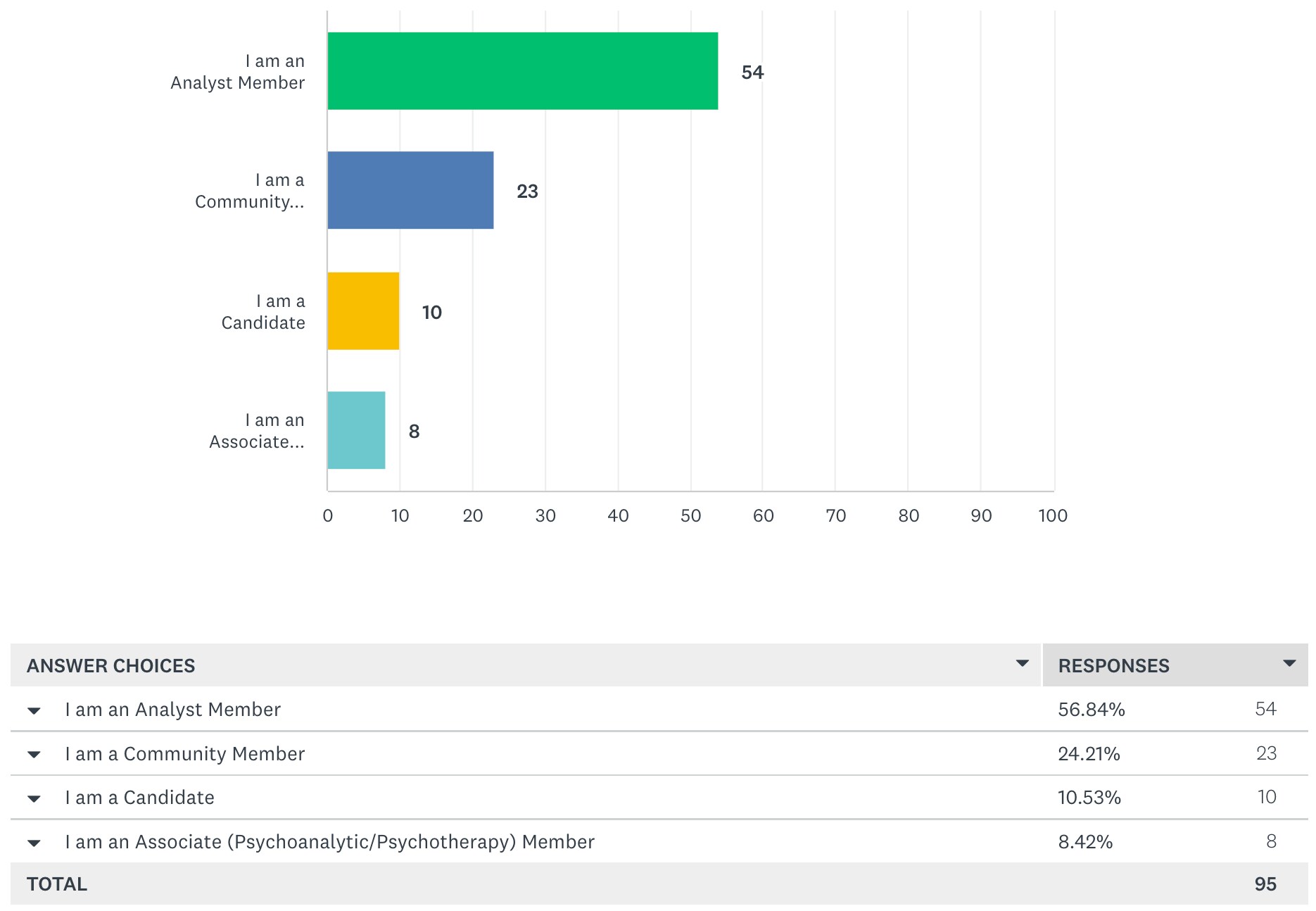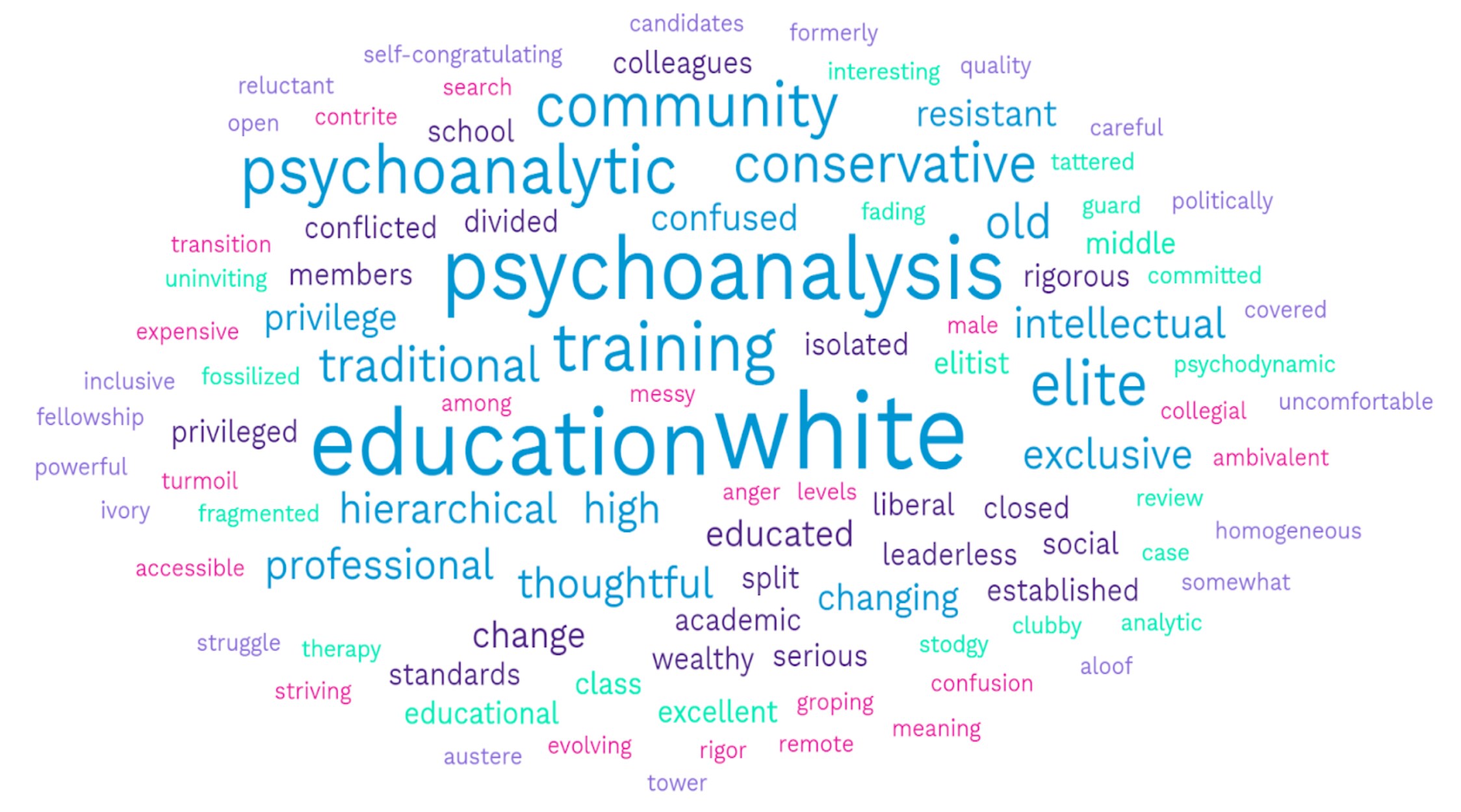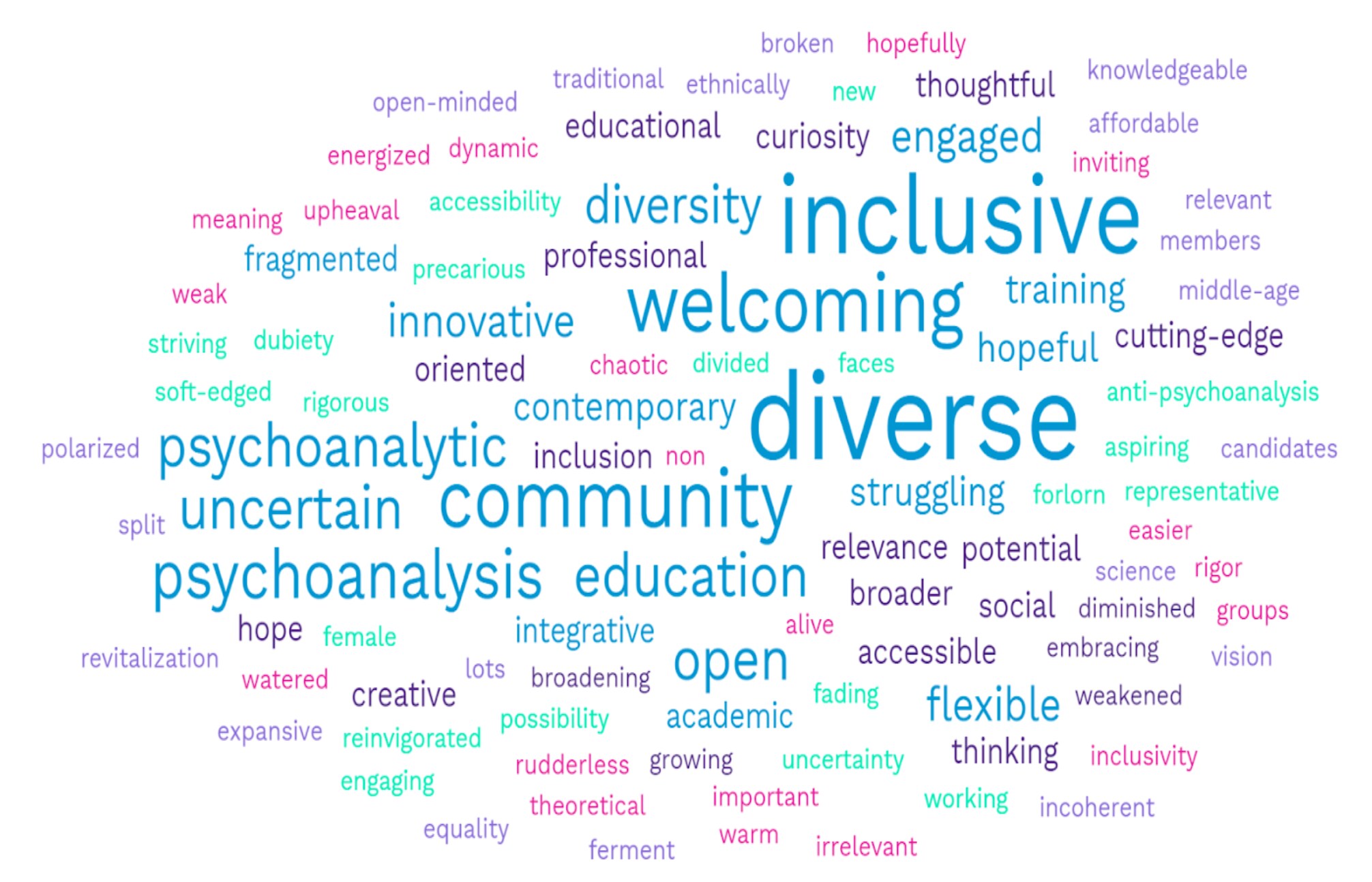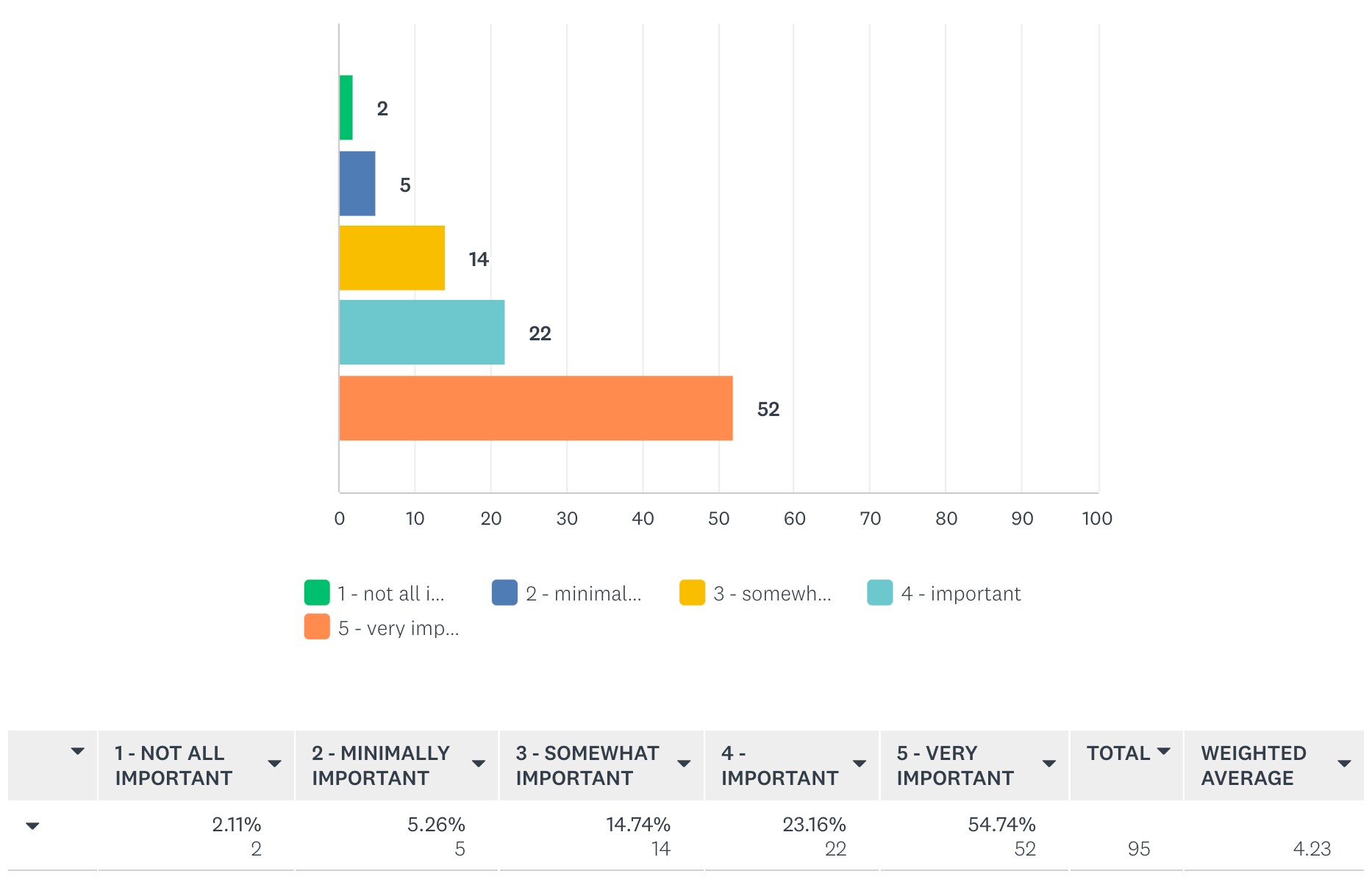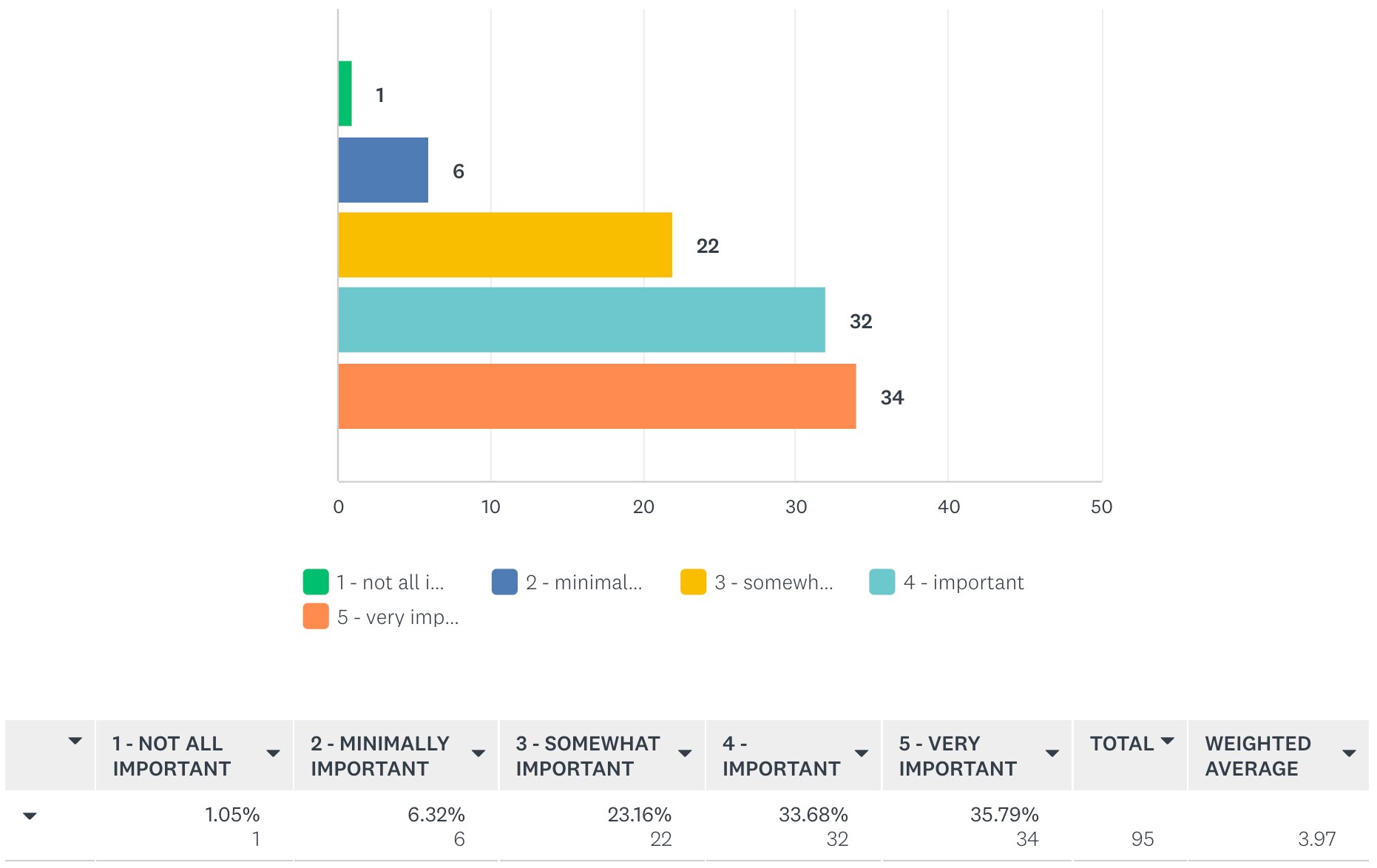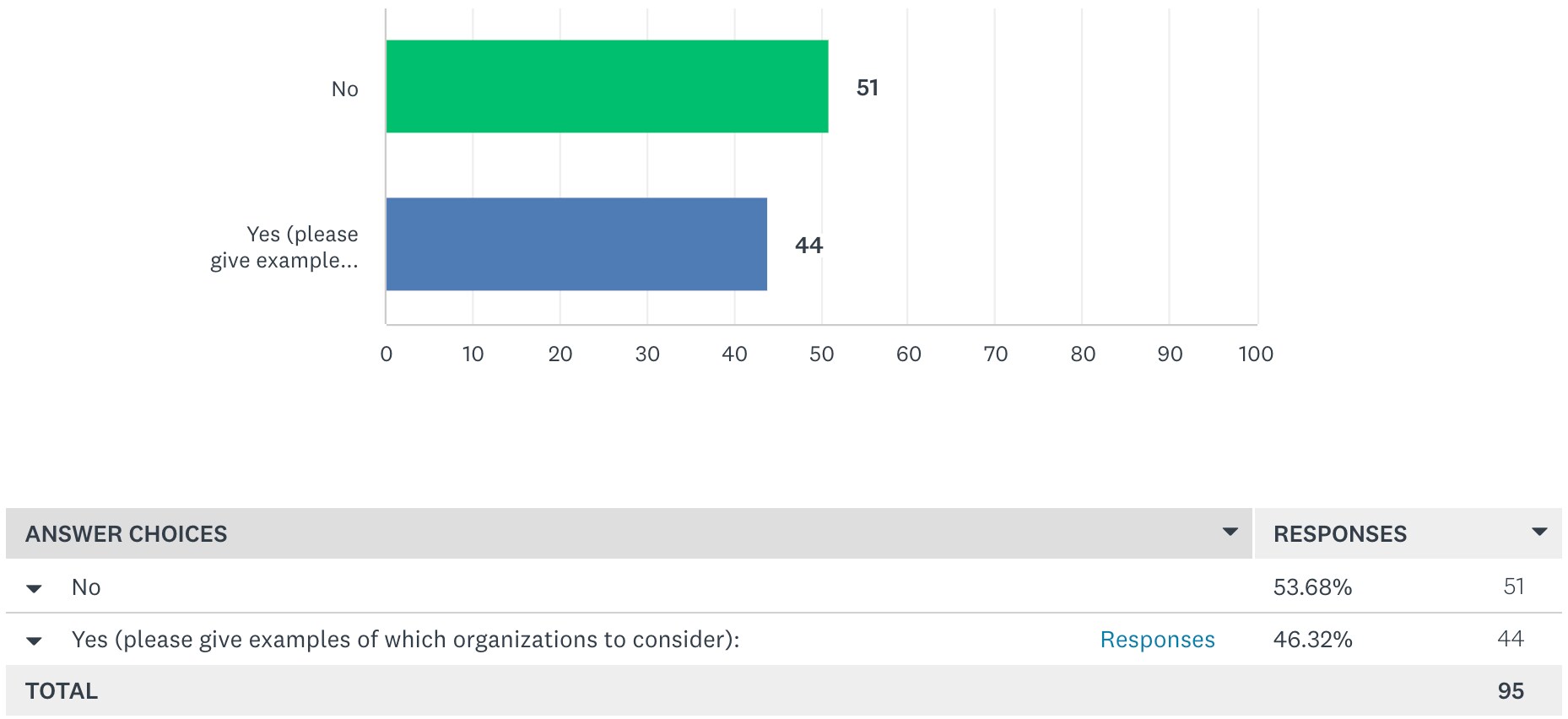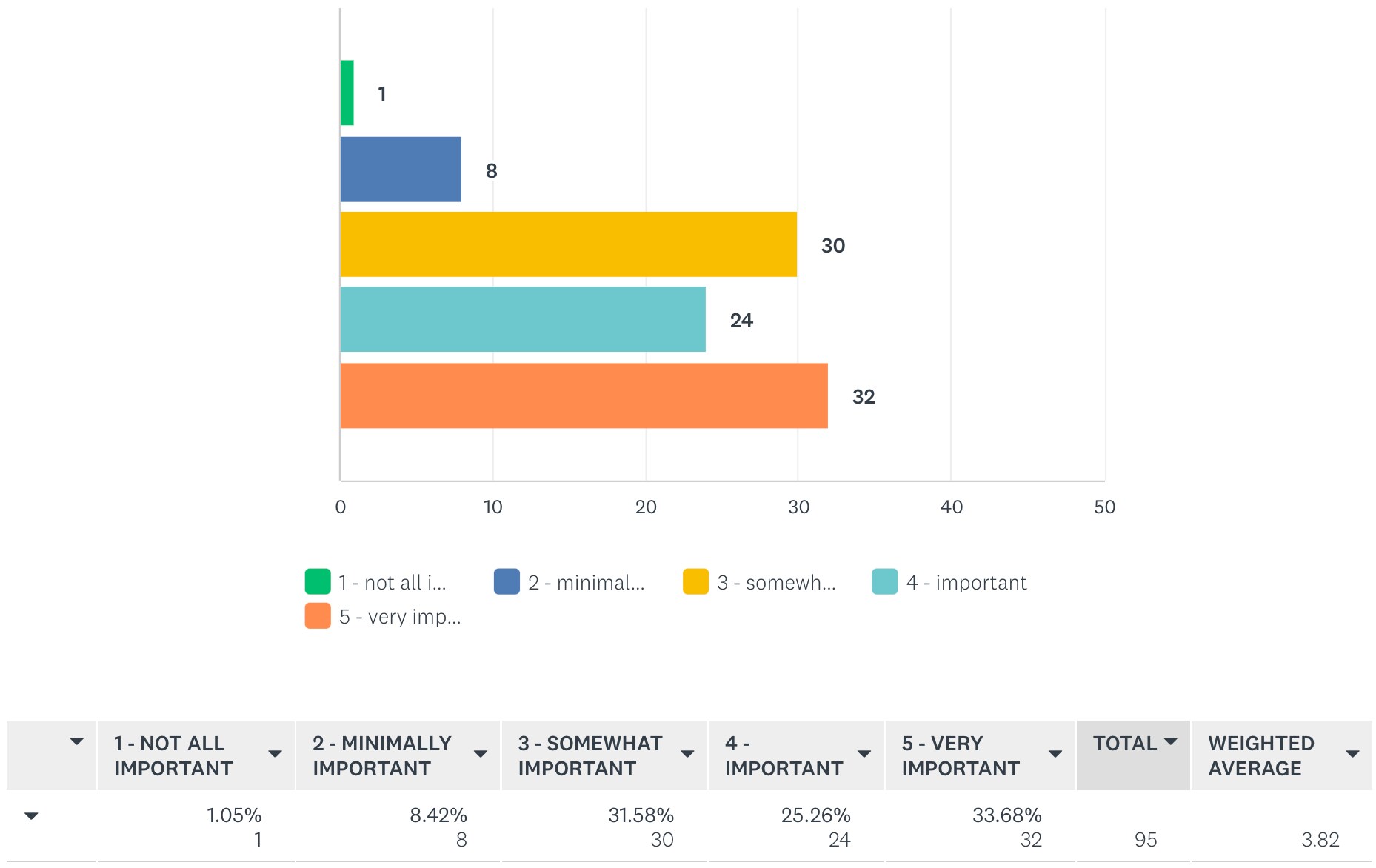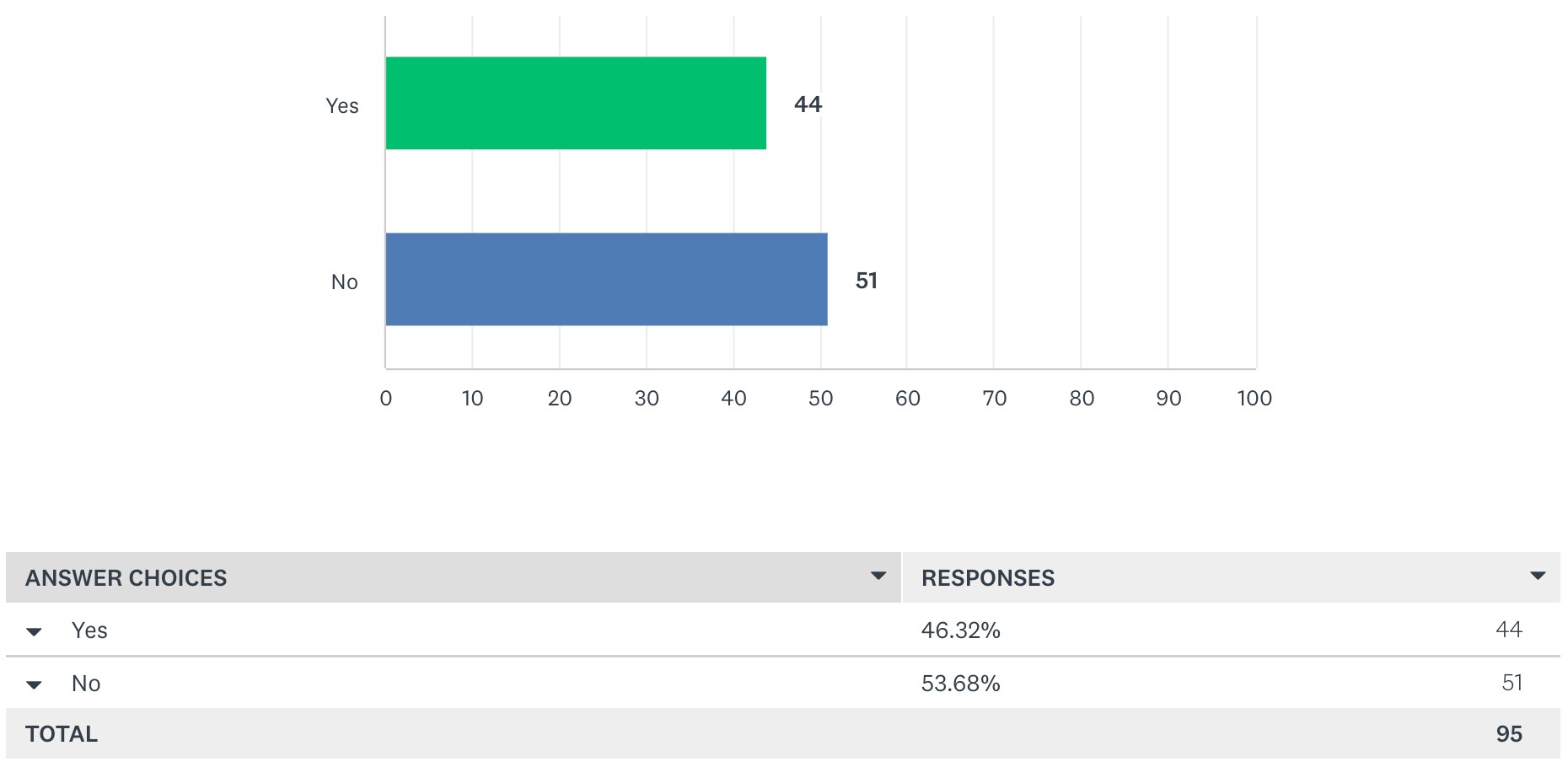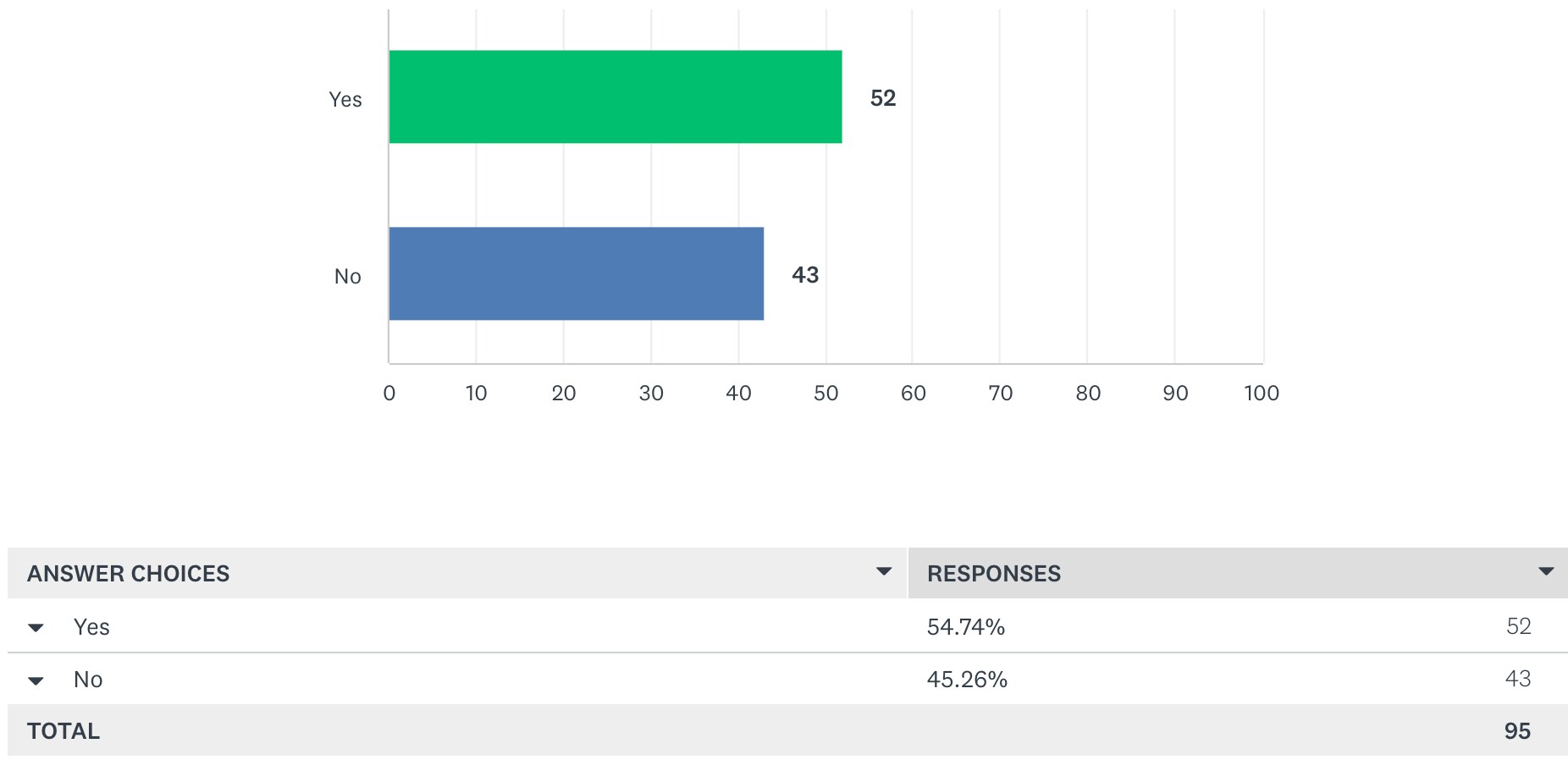Identity and Diversity Survey Preliminary Results
Below you will find preliminary results of the Identity and Diversity Survey recently sent a few weeks ago in preparation for the Strategic Plan process. When we sent the survey, we indicated the results will remain confidential. So we are aware of that as we share these results.
Below You will find for each question, the bar graph results, the “Answer Choices” responses in percentages, and total number of responses.
We quickly looked at comments and grouped many of them to create themes. For a couple of the questions, we created “word clouds” where the most repeated answers stand out. This was not a rigorous process. We are sharing the data in this fashion to give you a general sense of teh replies. We will look at the data in more depth later.
If you have any questions or comments, please contact our Administrative Director, Marcia Hodges at marcia.hodges@sfcp.org.
Q1: Please tell us which membership category you belong to:
There were 95 respondents and no comments.
Q2: When you think of SFCP’s current identity, what 3 words come to your mind?
There were 95 respondents and 95 comments. For this question, we created a word cloud from the responses, with the most repeated responses in larger font.
Q3: When you think of SFCP’s future identity, what 3 words come to your mind?
There were 95 respondents and 95 comments. For this question, we created a word cloud from the responses, with the most repeated responses in larger font.
Q4. What are SFCP’s strengths in terms of diversity (however you define that)?
There were 95 respondents and 95 comments.
Answers included:
Range of Topics and Training Programs
- CCSW
- PPTP
- Child Colloquium
- Diverse range of training topics
Willingness to tackle Social Injustices
- Reflecting on Diverse Communities and Issues
- Anti-Racism Task Force
- Effort and Energy to Change
- Open to Dialogue
- Open to Opinions from the Community
Acceptance of Diverse Clinical Backgrounds, not just MDs
- Accept Early Professionals
- Diverse Clinical Backgrounds
Connections with other Diverse Organizations
- Connection with other mental health orgs
Acceptance of LGBTQ and other Cultural Differences
- Acceptance of LGBTQ
- Social Justice
- Acceptance of Socio-Cultural Differences
Increase in Racial Diversity especially with EJ Fund Opportunity
- Less White
- More POC
- Enrico Jones Tuition Credit Fund
Diverse Members and Leadership
- Diverse age groups
- Diverse leadership
- Membership categories
- Diverse Members and Candidate Groups
- Increase in Female Members/Faculty
Q5: What are SFCP’s strengths in terms of equity (however you define that)?
There were 95 respondents and 95 comments.
Answers included:
Programs beyond PED
- Programs such as CCSW and PPTP
- Keeps educational standards high
- The referral service
Creating Access
- Enrico Jones Tuition Credit Fund
- People are donating to Enrico Jones Tuition Credit Fund
- Reduced fees for Community Members
- Including community members and candidates as board members and on committees
- Accessible Events
- Roles in the Center based on their particular talents and skills, rather than assigned status
- Installment plans for tuition
- Acknowledging high cost of training
- Volunteer Faculty
- Member Volunteer Opportunities
- Younger Members
Wide Range of Perspectives
- Desire to be equitable / Aspiration to change
- Willingness to take on the issues
- Some willingness to shift positions of power
- Some members who understand the stresses of inequity
- Lower fee supervision and analysis
- Strong fighters in SFCP with progressive ideas
- Willingness to look closely at equity and look for ways to recognize internal assumptions and barriers
- A willingness to listen
- Try to treat all with respect
- Genuinely eager to broaden authority, responsibility, and leadership
Examples of Actions
- Sending out these surveys to everyone
- Intentional outreach to diverse communities
- The Management Team endeavors to balance the various interests of Divisions and Committees
- The role of Ombudsperson is designed to rectify inequities to individuals
- Hiring facilitators
Q6: What are SFCP’s strengths in terms of inclusion (however you define that)?
There were 95 respondents and 95 comments.
Answers included:
Diversity throughout SFCP’s Staff / Membership
- Diverse Staff
- Diverse Membership and Leadership
- Diverse Age Groups
- Open to Anyone to Contribute/Volunteer
- More POC Candidates
- More Welcoming
- Open to Diverse Group of Speakers
Programs with more Affordability and Differing Time Commitment
- More Affordable Programs
- Programs with different levels of Commitment
Decreased Elitism from the Past
- Develop policies to address social justice
- Decreasing emphasis on elitism
- Righting the wrongs of the past
Having Different Programs Lead to More Inclusion
- CCSW
- Committee on Groups
- PPTP
- PED
- Different Training backgrounds of Candidates
- Diverse Programs attract wider audience
Able to Reach Under-represented Communities
- Outreach towards underrepresented communities
- Promoting psychoanalysis with more open door
Efforts and Awareness of Inclusivity / Exclusivity
- Efforts/eager to be inclusive
- Recognizing internal assumptions and barriers
- Willingness to struggle
- Open to communication
- Willingness to change, not just talk
Resources provided to Include Others
- The SFCP Library
- Mentorship
- Resources offered to the community
Q7: What can SFCP, we, do to be relevant to people with diverse backgrounds and identity?
There were 95 respondents and 95 comments.
Answers included:
Program-related Suggestions
- Seminars and training that are of interest to, and sensitive to concerns of diverse communities
- Address and elaborate the ways in which a psychoanalytic model can inform and provide understanding of diverse experience and identity
- Transparency regarding how programs evaluate applications for training and appointment to all positions.
- Stress equity, diversity, inclusion in all programs at all levels
- Prioritize group work
- Reexamine attitudes that generally look down upon providers in non traditional settings
- Highlight DEI issues and programs on the SFCP website
- Endorse psychoanalytic thinking regardless of number of sessions per week
- Courses on the social unconscious, while maintaining rigorous training
- Study the research about what speaks to patients from non-northern european backgrounds
- More diverse faculty / guest speakers, including non western analysts
- Outreach, follow lead of CCSW and PPTP
- Curriculum that centers on social issues
- Provide more financial support for SFCP courses
- When we invite a speaker require of them to include clinical material where the patients are Black, Indigenous or People of Color (BIPOC) or economically disadvantaged, disabled or queer or some other non-dominant group.
- Require control cases to include at least one person from BIPOC, LGBTQ or sliding scale.
- Evaluate whether we have the talent to offer programs.
- Expand your scope to include existing and emerging analytic literature on the links between the sociocultural and the unconscious
- Learn what they are talking about and what’s missing for them, and provide explicit space and welcome to include those things
- Increase theory of professional identities
- Learn ways of conveying our concepts and ideas that don’t require alienating jargon
- Recruit analysts of color to be SFCP personal analyst
- Maintain high educational standards and provide excellent training
- Provide public workshops and seminars where people are honest and vulnerable with each other.
- Change the training standards to those recommended by the IPA review
- Revise courses to more directly address racism
- Require training and supervising analysts and teachers to demonstrate competency in being anti racist
- Mentorship
- Include cultural humility in programs
- Consult with CCSW; to learn how to create a diversity-friendly psychoanalytic space
Structural Changes
- Implement the ARTF’s recommendations
- Stop relying on historically hierarchical processes
- Modify the Strategic Planning Process to invite participation as possible in order to widen the pool of contributing participants
- Create a temporary Mission statement centering DEI values
- Change fee structure
- Change displays/photos in the building
- Get rid of donor wall
- Increase democratic governance structures
- Leadership undertake policy stances ; 1) debt free licensable clinical education, 2) commensurate reimbursement rates for people treating the poor as received for people treating the rich, and 3) some form of well paid universal access to mental health services
- Expand scholarship to need based
- Require the board and committees to include at least 50% membership from non-dominant groups
Community Outreach
- Partner with community organizations
- Offer low-fee or pro bono tx to marginalized populations
- Develop collaborative programs with community orgs to introduce other clinicians to psychoanalysis and introduce psychoanalysis to outside clinical thinking
- Outreach to community clinics and MA-level educational institutions training MFTs, LCSWs, etc
DEI Training at SFCP
- Listen, consider the possibility that SFCP can learn, not just teach
- Increase SFCP’s self-awareness of what about SFCP may be off-putting to people with diverse backgrounds and identity
- Expand conversations about the impact of race, culture, gender and sexuality on a person’s internal experience
- Understand our own unconscious racism in group settings
- Stay open and vulnerable to how much we don’t know
- Re-examine the teacher as “powerful knower”, help instructors realize their need for prestige and power in the face of the great uncertainty of this work
- Acknowledge and come to terms with the oppressive history of psychoanalytic institutions. Acknowledge that we have been exclusive and hurtful
Q8 How important is it to you that SFCP increases diversity, equity, and inclusion (however you define those) of our membership?
There were 95 respondents and no comments.
Q9: How important is it to you that SFCP collaborate with Bay Area community mental health organizations?
There were 95 respondents and no comments.
Q10: Would you increase your volunteer time to collaborate with Bay Area community mental health organizations?
There were 95 respondents and 44 comments. Examples of which organizations to consider:
- Teaching psychoanalysis to the public
- Front line / hospitals
- Undocumented people
- Past offenders
- Psychoanalytic based organizations
- Race based organizations
- Substance abuse
- Government departments
- Working with children
- Unhoused / homeless communities
- Pregnant people / early parenthood
- School / Education
Q11: How important is it to you that SFCP engages in meeting the mental health needs of the Bay Area community?
There were 95 respondents and no comments.
Q12: Would you volunteer time to meet Bay Area community mental health needs through SFCP?
There were 95 respondents and no comments.
Q13: If you answered 3 or higher on Q8 and/or Q9, what specifically do you think SFCP should do to engage in these pursuits?
There were 74 respondents and 21 comments.
Outreach Programs
- Work with County Health Departments
- Advertise volunteer positions in the community
- Outreach at universities, institutions, and colleges that are not UCSF and The Wright Institute
- Designate a committee that works on the task of being more involved in community mental health needs.
- One time meetings with SFCP members who already volunteer in community agencies to learn about that work and to invite more SFCP members to participate
- Providing clinical consultation to clinicians that work in community mental health
- Help supervise and teach workers who are with community mental health programs
- Outreach for our low fee clinic
- Offer free training to staff at community mental health facilities.
- Public talks, talks in schools and other community groups.
- SFCP should fund free consultation programs to community organizations of all kinds
- Create more programs and offer them at community locations other than SFCP itself. Get way better at publicizing our events. Arrange meaningful ways to give tangible recognition and support to Members and Community Members who contribute to these efforts.
- SFCP should offer free or very low cost therapy
- Consult with community mental health staff about what THEY could use, to see if there’s a fit
- Partner and commit to a long term follow through. for example, when we moved to Natoma street we hosted two community meetings with a big turnout to the first, a reasonable turnout to the second and then no follow through. There are plenty of community collaborations right in our hood.
- I think that becoming a resource for providing mental health services and providing education and training to employees of community mental health workers could bring SFCP into an arena where equality and diversity are expected by everyone.
- Find those able and willing to devote their energy and time and acknowledge and compensate them whenever possible.
- I think we need to be open to other mental health clinicians practices and do outreach so we can know what we can offer
DEI Planning
- Consult with PINC who is already engaged in this endeavor and integrating it into their curriculum
- Develop a strategic plan around this issue
Structural Considerations
- Realize we are a small membership organization, with limited expertise in community mental health.
- Give academic credits to candidates to act as liaisons. Consider offering credit and appreciation in some way vs. asking for more.
- Take stances/advocate for public policy positions that can broaden access to clinical education, mental health services, and equitable reimbursement rates for those who provide services to people who can’t pay out of pocket.
Develop Programs
- Engage in some study of relevant concepts in social psychology; anthropology; sociology, including literature by and about analysts
- Form a study group around Fahkry David’s book Internal Racism
- Classes, lectures, symposiums that have relevance to CMH, e. g. complex trauma, poverty, racial trauma, the importance of psychoanalytic listening, low fees or free events/lectures, programs for CMH.
- SFCP needs to continue to make efforts to explain the value of psychoanalytic thinking to the larger community. And it needs to offer ways that community mental health organizations can experience the usefulness of psychoanalytic approaches.
- Offer more integration of community mental health work in all training
- Reinvigorate SFCP’s low fee referral service
- Teach Balint groups
- SFCP can encourage members to present their clinical experience and scholarship at various community organizations in the Bay Area. This is valuable training for community mental clinicians.
- Develop shared programs. Co sponsor events
- Create a community psychoanalysis track with community placements
Q14: Would you volunteer your time to participate in doing what you suggest?
There were 95 respondents and no comments.

